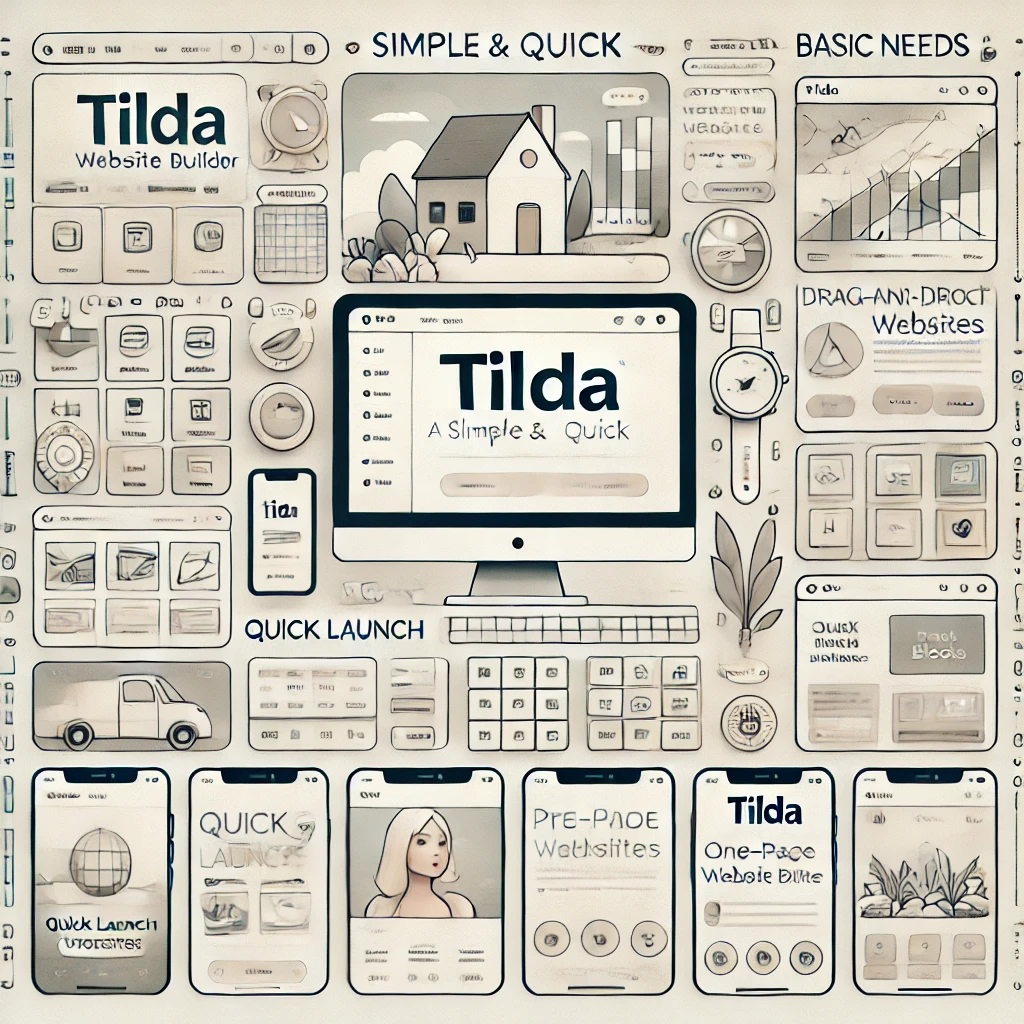Building a website is a crucial step in the development of any business. The platform you choose directly impacts the website’s functionality, cost, and scalability. In this article, we’ll delve into the key differences between Tilda and WordPress, examine when to use each platform, and analyze their pros and cons. We’ll also focus on how platform choice affects SEO to help you avoid the double costs of redesigning your website in the future.
Why Do Clients Choose Tilda or WordPress?
During SEO consultations, I often encounter website owners using Tilda. When asked why they chose this platform, common responses include: “It was recommended,” “I heard it’s easier and faster,” or “It’s a popular platform.” However, such advice often comes from non-specialists who may not fully understand the business’s requirements, especially when it comes to SEO.
Before recommending a platform, it’s essential to clarify:
- What features are necessary?
- Which traffic channels are planned?
Without this information, it’s challenging to choose the right solution.
Quick Answer: Tilda or WordPress?
If your goal is long-term SEO and website growth, WordPress—or any full-fledged CMS—is the clear choice. The main reason is Tilda’s limitations, which hinder SEO and scalability. Moreover, migrating from Tilda to WordPress later will almost double the costs.

Key factors in choosing a platform:
- Cost and development time: For landing pages or multi-page sites, the cost and development process on Tilda and WordPress are similar (e.g., prototyping, design, coding).
- Functionality: WordPress offers far more customization options than Tilda or other website builders (e.g., Craftum, Flexbe).
- No restrictions: WordPress enables the implementation of any custom features.
- Flexibility: A WordPress landing page can easily be expanded into a multi-page website, crucial for SEO.
If you’re not convinced by these points, let’s dive deeper into each platform’s specifics.
WordPress: A Powerful CMS for Websites of Any Complexity
WordPress (WP) is a full-fledged content management system with open-source code. Over 50% of websites worldwide are built on this platform. It’s beginner-friendly yet supports projects of any complexity, from blogs to large e-commerce stores.
Advantages of WordPress
- Wide range of themes and plugins:
-
- Free and paid templates enable quick website launches.
- Plugins expand functionality (e.g., SEO, analytics, forms, online stores).
- Example: Use the Yoast SEO plugin for optimizing meta tags, analyzing text, and checking content for SEO.
- Scalability:
-
- A one-page landing site can evolve into a complex multi-page website.
- Integrate with external services like CRM, email marketing, and online payments.
- SEO capabilities:
-
- Full control over URLs, meta tags, and site structure.
- Example: For organic traffic, WordPress allows detailed optimization of internal linking and schema markup.
- Development flexibility:
-
- Customize for any requirement, from unique designs to advanced functionality.
Disadvantages of WordPress
- Requires more time for learning and setup.
- Needs hosting and regular updates.
Tilda: A Simple and Quick Builder for Basic Needs
Tilda Publishing is a visual website builder with a closed-source code, focusing on simplicity and speed. It’s ideal for quickly creating landing pages or portfolio sites using pre-designed templates.
Advantages of Tilda
- Ease of use and speed:
-
- Launch a site in a day using ready-made blocks.
- Example: Create a landing page for a promotional campaign with a minimal budget.
- User-friendly interface:
-
- No coding knowledge required.
- Suitable for small businesses needing a straightforward website.
- Cost-effectiveness:
-
- Lower initial expenses since there’s no need for developers or complex configurations.
Limitations of Tilda
- Closed system:
-
- Limited to built-in blocks and features.
- Example: Custom calculators or advanced code modifications are not possible.
- SEO challenges:
-
- Limited optimization options for meta tags, URL structures, and page speed.
- Example: Tilda websites often struggle to achieve high search engine rankings.
- Scalability issues:
-
- Growth beyond the platform’s capabilities necessitates migrating to another CMS.
- Example: Expanding a business might require moving to WordPress, increasing costs.
- Subscription restrictions:
-
- The “Personal” plan limits pages (500) and products (5,000). Domain connection requires a paid plan.

How to Choose the Right Platform for Your Project
Recommendations:
- Choose WordPress if:
-
- You need advanced website functionality.
- SEO is a priority.
- You want a site that can scale with your business.
- Example: An online store with CRM and analytics integration.
- Choose Tilda if:
-
- You need a quick launch for a landing page, portfolio, or small online store.
- Paid ads are your main traffic source.
- Long-term development isn’t planned.
- Example: A promotional page for an event.
Conclusion
Tilda is an excellent choice for quickly creating simple websites with minimal investment. However, if your project focuses on SEO, flexibility, and scalability, WordPress is the more sustainable solution. Remember: choosing the right platform is an investment that saves money and effort in the long run.
Examples of Using WordPress and Tilda
Example 1: E-commerce Store
- WordPress: A furniture store with over 10,000 products using the WooCommerce plugin. Includes CRM integration, online payments, and automated notifications.
- Tilda: A small shop selling handmade jewelry with up to 100 products. Set up via standard modules with Google Analytics integration.
Example 2: Blog
- WordPress: An SEO-optimized blog with categories, comments, and a search feature. Example: A travel agency’s blog with articles and tour promotions.
- Tilda: A photographer’s personal blog with short posts and a portfolio. Best for attracting clients through paid ads.
Example 3: Event Landing Page
- WordPress: A site for an annual conference with complex functionality like participant registration, e-ticket generation, and a detailed schedule.
- Tilda: A one-day event landing page with basic info: speaker bios, a location map, and a simple registration form.







I can’t believe how much value you packed into this post. It’s a must-read for anyone in the field.
Thank you! I’m so glad the post was helpful to you.
This post really resonates with me. You’ve perfectly articulated what I’ve been thinking!